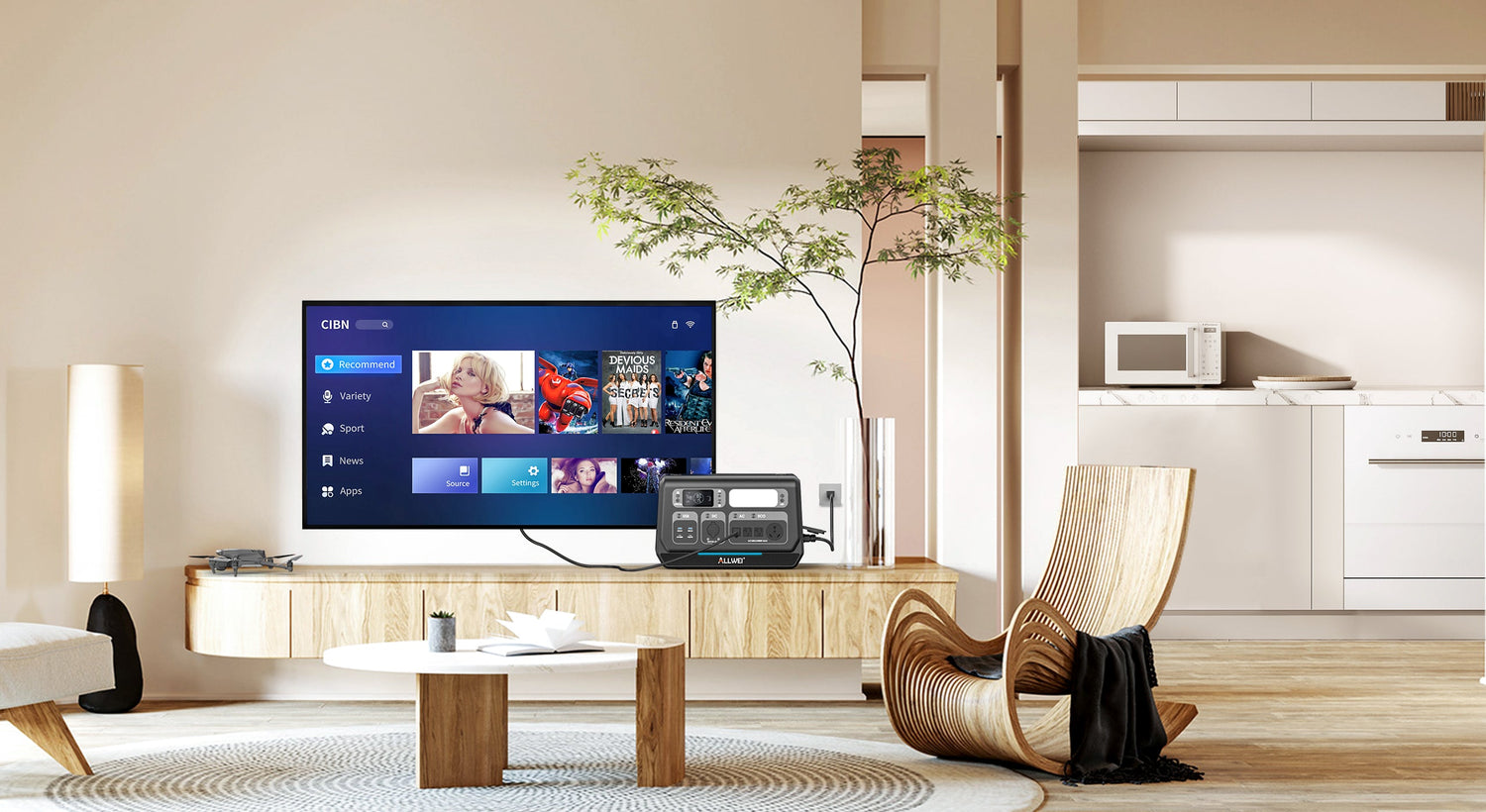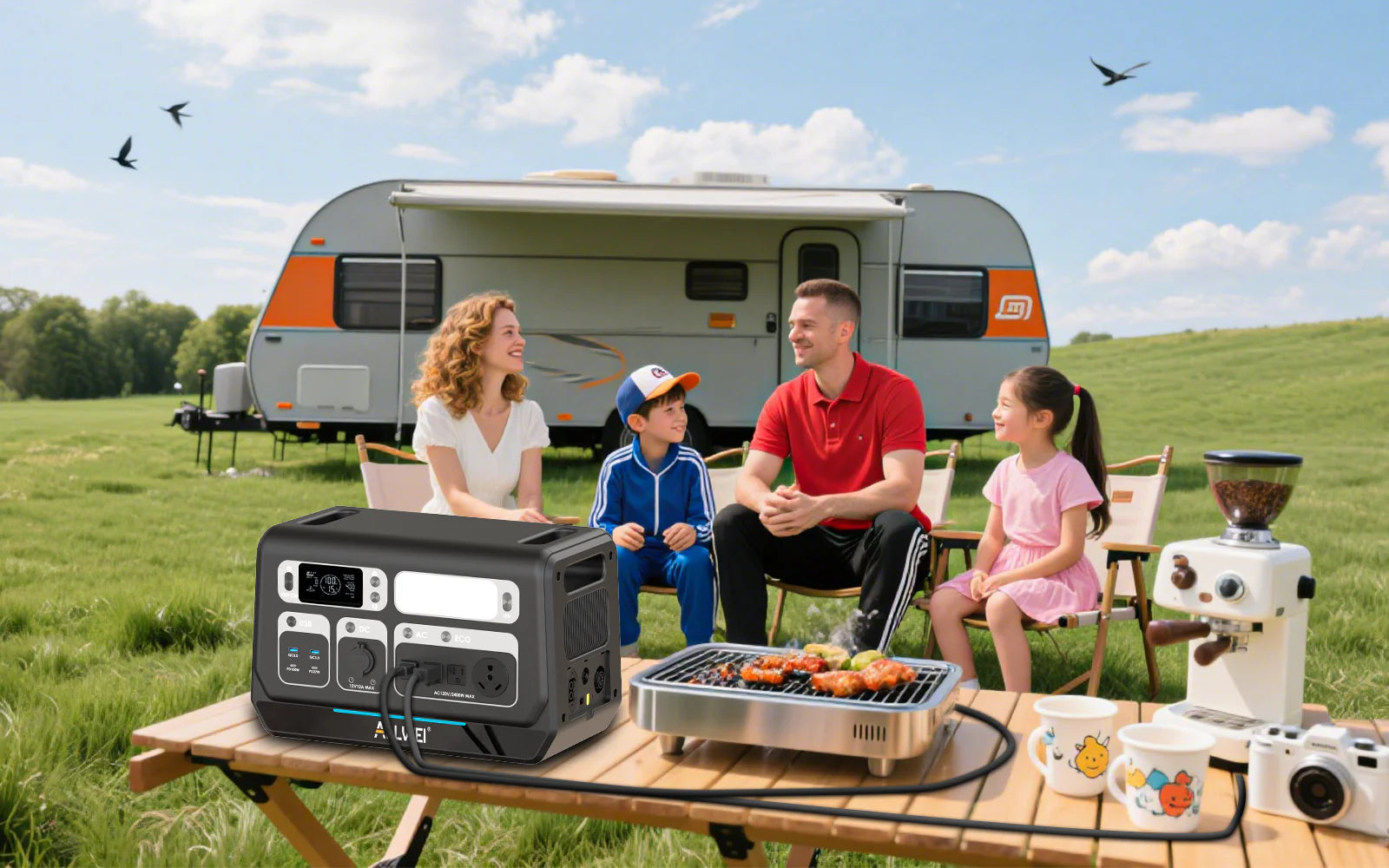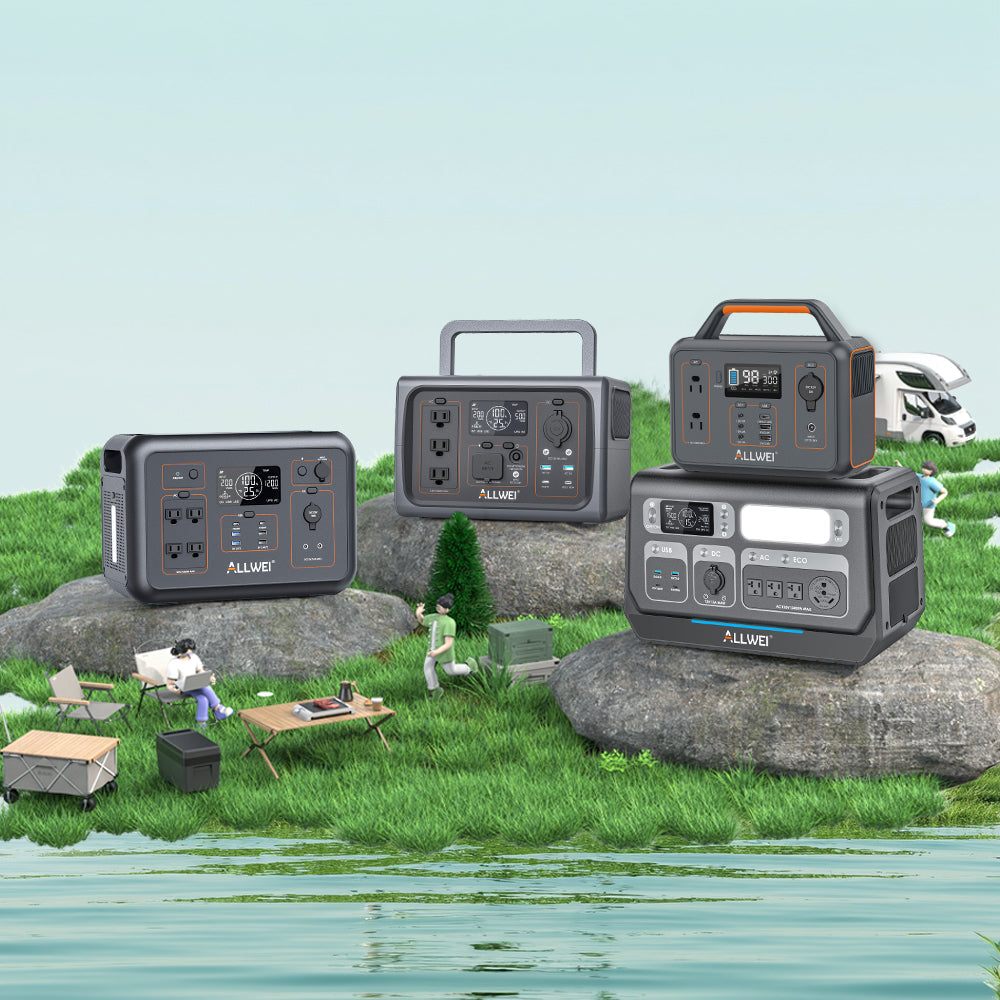Introduction
Portable power stations have become essential equipment for modern life, providing reliable power for outdoor adventures, emergency situations, and off-grid living. With so many options available, choosing the right portable power station can be overwhelming. This comprehensive buying guide will help you understand the key factors to consider and make an informed decision.
ALLWEI offers a range of portable power stations designed to meet various needs and budgets. From the compact PPS300 to the powerful PPS2400, each model is engineered with advanced technology and practical features for real-world applications.
Understanding Portable Power Station Basics
What is a Portable Power Station?
A portable power station is a battery-powered generator that stores electrical energy and provides power through various output ports. Unlike traditional generators that burn fuel to create electricity, portable power stations use rechargeable batteries to store energy that can be used when needed.
Key Components
Every portable power station consists of:
Battery: Stores electrical energy (measured in watt-hours)
Inverter: Converts DC battery power to AC power for household appliances
Charge Controller: Manages the charging process and protects the battery
Output Ports: Various connectors for different devices and appliances
Display: Shows battery level, power consumption, and system status
Essential Specifications to Consider
Battery Capacity (Watt-Hours)
Battery capacity is the most important specification, measured in watt-hours (Wh). This determines how long your power station can run your devices.
ALLWEI Capacity Options:
PPS300: 280Wh - Basic charging and small devices
PPS600: 512Wh - Extended use and multiple devices
PPS1200: 1008Wh - Family use and small appliances
PPS2400: 2048Wh - Professional use and large appliances
How to Calculate Your Needs:
1. List all devices you want to power
2. Note the wattage of each device
3. Estimate how many hours you'll use each device
4. Multiply wattage by hours to get watt-hours needed
5. Add 20% buffer for efficiency losses
Power Output (Watts)
Power output determines what devices you can run simultaneously.
ALLWEI Power Output Options:
PPS300: 300W - Phones, tablets, LED lights
PPS600: 500W - Small appliances, fans, coolers
PPS1200: 1200W - Electric stoves, refrigerators, power tools
PPS2400: 2400W - Large appliances, multiple devices
Understanding Power Requirements:
Smartphone charger: 5-10W
LED light: 5-15W
Laptop: 50-100W
Portable fan: 20-50W
Electric cooler: 50-100W
Refrigerator: 150-400W
Electric stove: 1000-2000W
Battery Technology
The type of battery affects performance, lifespan, and safety.
LiFePO4 (Lithium Iron Phosphate) - ALLWEI Standard:
Lifespan: 3,500+ charge cycles
Safety: Excellent thermal stability
Performance: Consistent power output
Maintenance: Minimal maintenance required
Advantages over other battery types:
Longer lifespan than lithium-ion
Better safety than lead-acid
Higher energy density than traditional batteries
No memory effect
Output Options and Connectivity
AC Outlets
Standard household outlets for powering appliances:
PPS300: 1 AC outlet
PPS600: 2 AC outlets
PPS1200: 2 AC outlets
PPS2400: 2 AC outlets
USB Ports
For charging mobile devices and small electronics:
USB-A: Standard USB charging
USB-C with Power Delivery: Fast charging for modern devices
Wireless Charging: Available on some models
DC Outputs
For 12V devices and automotive applications:
12V Car Outlet: For car accessories
DC Barrel Connectors: For specific devices
Anderson Connectors: For high-power applications
Charging Options and Flexibility
AC Wall Charging
Fastest charging method when grid power is available:
PPS300: 4-6 hours to full charge
PPS600: 6-8 hours to full charge
PPS1200: 8-10 hours to full charge
PPS2400: 10-12 hours to full charge
Solar Charging
Renewable energy charging for off-grid use:
Compatibility: Works with ALLWEI solar panels
MPPT Technology: Maximum power point tracking for efficiency
Charging Time: Varies based on panel size and sunlight
Portability: Solar panels designed for easy transport
Car Charging
Charging from vehicle power system:
Convenience: Charge while traveling
Speed: Slower than AC charging but portable
Compatibility: Works with most vehicles
Safety: Built-in protection for vehicle electrical systems
Use Case Analysis and Recommendations
Weekend Camping and Outdoor Activities
Recommended: PPS300 or PPS600
Power Needs: Basic charging, LED lights, small devices
Key Features:
Lightweight and portable
Multiple USB ports for device charging
AC outlet for small appliances
Solar charging capability
Extended Camping and RV Living
Recommended**: PPS1200 or PPS2400
Power Needs: Multiple devices, small appliances, comfort items
Key Features:
Higher capacity for extended use
Multiple AC outlets for appliances
Solar integration for renewable charging
Professional-grade performance
Emergency Backup Power
Recommended: PPS1200 or PPS2400
Power Needs: Essential appliances, medical equipment, communication
Key Features:
Reliable power during outages
Medical equipment compatibility
Extended runtime capabilities
Multiple charging options
Professional and Commercial Use
Recommended: PPS2400
Power Needs: Power tools, professional equipment, multiple devices
Key Features:
Maximum power output
Professional-grade construction
Extended battery life
Comprehensive connectivity options
Advanced Features and Technology
Pure Sine Wave Inverter
Essential for sensitive electronics:
Compatibility: Works with all household appliances
Protection: Prevents damage to sensitive devices
Performance: Clean, stable power output
Efficiency: Better energy conversion
MPPT Solar Charging
Advanced solar charging technology:
Efficiency: Extracts maximum power from solar panels
Adaptability: Adjusts to varying sunlight conditions
Protection: Prevents overcharging and damage
Performance: Faster charging than traditional controllers
Smart Monitoring and Control
Advanced system management:
LCD Display: Real-time system information
Mobile App: Remote monitoring and control
Battery Health: Monitoring and diagnostics
Firmware Updates: Regular system improvements
Safety Features
Comprehensive protection systems:
Overcharge Protection: Prevents battery damage
Short Circuit Protection: Electrical safety
Temperature Monitoring: Thermal protection
Overload Protection: Device and system protection
Portability and Design Considerations
Size and Weight
Important for transportation and storage:
PPS300: Most portable, ideal for backpacking
PPS600: Good balance of capacity and portability
PPS1200: Suitable for car camping and RV use
PPS2400: Best for stationary or vehicle-based use
Durability and Construction
Built for real-world use:
Rugged Design: Withstands outdoor conditions
Weather Resistance: Protection from elements
Impact Resistance: Durable construction
Quality Materials: Long-lasting components
Ergonomics and Usability
User-friendly design features:
Ergonomic Handles: Easy transportation
Clear Controls: Intuitive operation
Accessible Ports: Easy device connection
Stable Design: Secure placement options
Cost Considerations and Value Analysis
Initial Investment
Understanding total cost of ownership:
Base Unit: Power station cost
Accessories: Cables, cases, mounting hardware
Solar Panels: Optional renewable charging
Installation: Professional setup if needed
Long-term Value
Calculating return on investment:
Energy Savings: Reduced fuel costs
Maintenance Costs: Minimal ongoing expenses
Lifespan: 3,500+ charge cycles
Versatility: Multiple applications
Comparison with Alternatives
Evaluating different power solutions:
vs. Gas Generators: Quieter, cleaner, more portable
vs. Traditional Batteries: Higher capacity, better technology
vs. Grid Power: Independence, backup capability
vs. Other Brands: ALLWEI's advanced technology and reliability
Making Your Final Decision
Step-by-Step Selection Process
1. Assess Your Power Needs: Calculate required capacity
2. Consider Your Use Case: Match features to applications
3. Evaluate Portability Requirements: Size and weight considerations
4. Review Charging Options: Available power sources
5. Compare Features: Advanced technology and safety
6. Calculate Total Cost: Initial investment and long-term value
7. Read Reviews: Customer feedback and experiences
8. Check Warranty: Protection and support options
ALLWEI Model Comparison
Quick reference guide:
PPS300: Entry-level, basic needs, maximum portability
PPS600: Mid-range, extended use, good balance
PPS1200: Advanced, family use, comprehensive features
PPS2400: Professional, maximum capacity, full-featured
Post-Purchase Considerations
Setup and Initial Use
Getting started with your power station:
Initial Charging: Full charge before first use
System Testing: Verify all functions work properly
Accessory Setup: Install necessary cables and mounts
Safety Review: Understand operating guidelines
Maintenance and Care
Keeping your system in optimal condition:
Regular Cleaning: Keep unit clean and dry
Battery Monitoring: Check health and performance
Connection Inspection: Verify cables and connections
Software Updates: Keep firmware current
Accessories and Add-ons
Enhancing your power station:
Solar Panels: Renewable charging capability
Carrying Cases: Protection and portability
Extension Cables: Additional connectivity options
Mounting Hardware: Secure installation options
Conclusion
Choosing the right portable power station is a significant decision that affects your power independence and lifestyle. ALLWEI's range of portable power stations provides options for every need, from basic outdoor charging to comprehensive home backup systems.
The key to making the right choice is understanding your specific power requirements, considering your use case, and evaluating the features that matter most to you. Whether you're a weekend camper, RV enthusiast, emergency preparedness advocate, or professional user, ALLWEI has a portable power station designed to meet your needs.
Investing in a quality portable power station from ALLWEI means investing in reliability, technology, and peace of mind. With advanced LiFePO4 battery technology, comprehensive safety features, and flexible charging options, ALLWEI power stations provide the performance and durability you need for any application.
Remember that the best portable power station is the one that meets your specific needs while providing room for growth and adaptation. Start with your current requirements, but consider your future needs when making your selection. With ALLWEI's modular design and expandable systems, you can always add capacity and features as your needs evolve.




Leave a comment
This site is protected by hCaptcha and the hCaptcha Privacy Policy and Terms of Service apply.